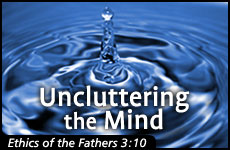 Vampire Weekend's Surprising Jewish Stories
Vampire Weekend's Surprising Jewish Stories


5 min read
A cloudy mind clears for those things that truly matter.
Rabbi Dostai ben Yannai said in the name of Rabbi Meir: If one forgets his Torah study, scripture considers it as if he bears the guilt for his own soul, for the verse says, "Take heed and guard yourself well, lest you forget the things that your eyes saw" (Deuteronomy 4:9). Should one think this applies even if his studies were too difficult for him? The verse therefore continues, "and lest they be removed from your heart all the days of your life." Thus, one does not bear the guilt for his soul unless he sits idle and allows them to become removed from his heart. Ethics of the Fathers, 3:10
In his extraordinary memoir, Skullcaps and Switchblades, David Lazerson describes how the teenagers he taught in New York's inner-city schools, identified as learning disabled and seemingly incapable of remembering the most rudimentary facts in math, English, and history, nevertheless had no trouble retaining the complex lyrics of popular rap music. When asked to explain his perfect recall, one student explained simply, "If you don't know the words, you ain't nuthin'!"
It is remarkable indeed how children demonstrate an ability to remember events, conversations, music lyrics, movie dialogues -- not to mention every inconsistency or perceived injustice ever perpetrated upon them by their parents or teachers. Yet somehow this gift of memory applies itself selectively, often passing by such pedestrian information as school subjects and household chores.
But there's really no mystery. People remember what's important to them, and quickly forget what isn't important to them. Children, whose minds are still uncluttered by years of accumulated (and often useless) information, remember better because their brains are both more flexible and also because their worlds resonate with the excitement of novelty and exploration and discovery. So much is remembered because so much is new, except when it is imposed upon them by authority figures against whom their budding egos are eager to rebel.
THE REBBE AND THE INNER CHILD
Rabbi Abraham Twerski tells the story of a group of Chassidim gathered around their rebbe's table on some festive occasion. The table ran short of supplies, and the rebbe asked if one of his students would go out to procure some more. When no one volunteered, the rebbe said that he had a boy who would run the errand. He then stepped out of the room, presumably to delegate the task.
After a long delay, the rebbe returned carrying the supplies, and the Chassidim realized with embarrassment that there had been no boy; it had been their rebbe himself who had gone off to fetch the groceries.
But the rebbe put them at ease. "Do not think I lied to you," he told them. I do have a ‘boy,' by which I mean the childlike part of myself that I have preserved and nurtured even into my old age. It is the part of me that allows me to find the novelty and adventure in even the most mundane activities."
"If we don't know the words, we ain't nuthin'!"
Even if we can't make a trip to the grocery store exciting, at least we should be able to arouse enthusiasm for those things that are truly important. Indeed, our sages tell us that the words of the Torah should be as new to us every day as they were when Moses received them at Sinai. A tall order, to be sure. But it's not beyond our reach.
Like the boy in David Lazerson's memoir, we can make Torah so relevant that learning is not a chore but a joy, and we can do so by cultivating a simple yet profound appreciation that, "if we don't know the words, we ain't nuthin'!"
AS PRECIOUS AS LIFE ITSELF
The sages compare Torah to water, because just as the body quickly withers and becomes ill without water, so too does the soul wither without Torah. They compare the Torah to a spice that adds flavor to all our comings and goings and adds relish to all the days of our lives. They compare it to a universal remedy, for it preserves our well-being and protects us from the spiritual ailment of too much involvement in the physical. Torah connects us with our past, defines our present, and steers us securely into the future. It adapts to the modern world without compromising its values, and it enables us to change with the times without losing our sense of who we are or what we believe.
And so Rabbi Dostai in the mishna reminds us what should be obvious but what is too easily forgotten. Just as a person might endanger his own physical and emotional well-being by neglecting his diet, his hygiene, his work, his marriage, the weather, the symptoms of ill health, or the traffic on the highway, even more so will he endanger his spiritual well-being if he neglects the welfare of his soul by not setting aside time to involve himself in Torah.
By contemplating the indispensability of Torah, we enable its words engrave themselves permanently and indelibly upon our minds and upon our hearts. All the clutter that occupies our thoughts and muddles our thinking miraculously makes way for the Divine words that we invite into our minds.
Of course, no one's memory is perfect. Even the boy in David Lazerson's school probably forgot a few lyrics from time to time. But if Torah means so little to us that we sit idly and let its words slip away from us, then we will have no excuse when we find ourselves afflicted with the symptoms of spiritual confusion and debilitation. How much wiser to take Rabbi Dostai's words to heart, to unclutter our brains and reap the benefits of a healthy spirit and a healthy soul.
